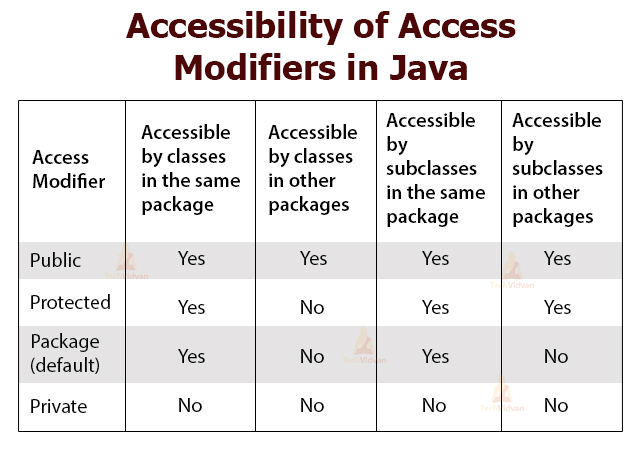Access modifiers Part 2
In the previous post we have seen both class and variables . Here we see about constructors and methods:
constructors:
looks like a method with the same name as class name and with no return type.
we can write i) no parameter and ii) parametrized constructor
useful in:
- creating object of the class
- initializes class instance variables
- (constructor receives parameters, we will pass arguments while calling constructor)
private: if class constructor is private, then class cannot be inherited or instantiated
class A extends Object {
private A() {
super();
}
}
class B extends A {
B() {
super(); // error
}
}
class C {
A a=new A(); // error
}
default: if developer writes a public class with default access specifier constructor,
then class can be inherited and instantiated within the package, but cannot be inherited or
instantiated outside the package.
class A {
A() {} // default constructor
}
public class A {
public A() {} // default constructor
}
- Q) What is default constructor?
- If we dont write any constructor in a class, during compilation time, compiler
- Automatically generates one no parameter constructor with access specifier as same as class access specifier.
Note: default constructor is not generated if developer generates a constructor
public class A {
A() {}
// explicitly written no parameter constructor. default access specifier constructor in public class
}
protected:
class A {
protected A() {} // explicit constructor
}
- class can be both inherited or instantiated within the directory/package classes.
- Because class is having default access specifier it cannot be accessed outside the package
public class A {
protected A() {} // explicit constructor
}
- The class can be both inherited or instantiated within the package classes and can be only inherited outside the package class, cannot be instantiated outside the package class
public:
- public class with public constructor can be both inherited or instantiated within and outside the package.
- class can be accessible anywhere within the system
public class A {
public A() {}
}
methods:
private: can be accessible only within the class
default: can be accessible only within the package (subclass or instantiated class)
protected: can be accessible within the package and upto sub class outside the package
public: can be accessible anywhere
abstract:
- method which contains only declaration/without implementation is called as abstract.
- class which contains abstract method must also be declared as abstract.
- abstract methods are implemented in abstract class sub class
abstract int sub(int a, int b); // only declaration
int sub(int a, int b) {} // implementation
final:
- final method cannot be overridden in sub class.
final double calAvg (int marks[]) {
int len = marks.length;
int sum=0;
double avg=0.0;
for(int i=0;i<marks;i++) {
sum+=marks[i];
}
avg=sum/len;
return avg;
}
static:
- Methods which dont want instance/dynamic memory, method which want class/static memory is declared as static
- As same as variables, static methods can be called classname
normal method:
class A {
void m1() {}
}
class B extends A {
void m1() {}
}
class C extends A {
}
A a=new A(); // memory is allocated to m1() method in A class memory
B b=new B(); // memory is allocated to m1() method in B class memory
C c=new C(); // memory is allocated to m1() method of A class memory
final method:
class A {
final void m1() {}
}
class B extends A {
}
class C extends A {
}
B b=new B(); In B class object memory's A class object memory m1() method memory is allocated
C c=new C(); In C class object memory's A class object memory m1() method memory is allocated
static and final method:
class A {
static final void m1() {}
}
class B extends A {
}
class C extends A {
}
B b=new B(); // In current class object's super class object memory, memory is
not allocated to m1(), a separate A class memory contains m1() method memory
C c=new C(); // same as above




0 Comments